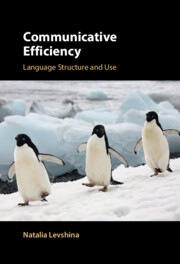Book contents
- Communicative Efficiency
- Communicative Efficiency
- Copyright page
- Dedication
- Contents
- Figures
- Tables
- Preface
- Acknowledgements
- Abbreviations
- Part I Different Types of Efficiency in Language
- Part II Efficiency and Language Evolution
- Part III Case Studies
- 7 Efficient Form–Meaning Mapping in Causative Constructions
- 8 Differential Case Marking and Efficiency
- 9 Efficient Use of Function Words in English Alternations
- 10 Conclusions and Perspectives
- Appendices
- References
- Index
8 - Differential Case Marking and Efficiency
from Part III - Case Studies
Published online by Cambridge University Press: 03 November 2022
- Communicative Efficiency
- Communicative Efficiency
- Copyright page
- Dedication
- Contents
- Figures
- Tables
- Preface
- Acknowledgements
- Abbreviations
- Part I Different Types of Efficiency in Language
- Part II Efficiency and Language Evolution
- Part III Case Studies
- 7 Efficient Form–Meaning Mapping in Causative Constructions
- 8 Differential Case Marking and Efficiency
- 9 Efficient Use of Function Words in English Alternations
- 10 Conclusions and Perspectives
- Appendices
- References
- Index
Summary
This chapter discusses diverse typological, corpus-based and experimental evidence related to differential argument marking of subject and object. The different types of evidence converge, supporting the efficiency-based interpretation of differential marking based on the principle of negative correlation between accessibility and costs. This chapter provides a novel contribution to this well-explored topic because the intuitions about the causes that lead to the emergence of cross-linguistic patterns are captured in the form of measurable probabilities that can be found in corpus data. Of particular importance here are conditional probabilities of the role given the referential features of arguments, which determine the accessibility of the intended role interpretation. This chapter also demonstrates that we can disentangle some competing explanations of differential marking using experiments with artificial language learning and communication.
Keywords
- Type
- Chapter
- Information
- Communicative EfficiencyLanguage Structure and Use, pp. 193 - 229Publisher: Cambridge University PressPrint publication year: 2022



